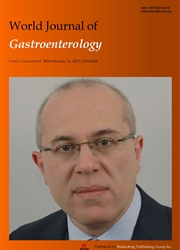

 中文摘要:
中文摘要:
Inflammatory bowel disease(IBD)is a chronic inflammatory disease thought to be mediated by the microbiota of the intestinal lumen and inappropriate immune responses.Aberrant immune responses can cause secretion of harmful cytokines that destroy the epithelium of the gastrointestinal tract,leading to further inflammation.Interleukin(IL)-22 is a member of the IL-10 family of cytokines that was recently discovered to be mainly produced by both adaptive and innate immune cells.Several cytokines and many of the transcriptional factors and T regulatory cells are known to regulate IL-22 expression through activation of signal transducer and activator of transcription 3signaling cascades.This cytokine induces antimicrobial m olecules and proliferative and antiapoptoic pathways,which help prevent tissue damage and aid in its repair.All of these processes play a beneficial role in IBD by enhancing intestinal barrier integrity and epithelial innate immunity.In this review,we discuss recent progress in the involvement of IL-22in the pathogenesis of IBD,as well as its therapeutic potential.
 英文摘要:
英文摘要:
Inflammatory bowel disease (IBD) is a chronic inflammatory disease thought to be mediated by the microbiota of the intestinal lumen and inappropriate immune responses. Aberrant immune responses can cause secretion of harmful cytokines that destroy the epithelium of the gastrointestinal tract, leading to further inflammation. Interleukin (IL)-22 is a member of the IL-10 family of cytokines that was recently discovered to be mainly produced by both adaptive and innate immune cells. Several cytokines and many of the transcriptional factors and T regulatory cells are known to regulate IL-22 expression through activation of signal transducer and activator of transcription 3 signaling cascades. This cytokine induces antimicrobial molecules and proliferative and antiapoptotic pathways, which help prevent tissue damage and aid in its repair. All of these processes play a beneficial role in IBD by enhancing intestinal barrier integrity and epithelial innate immunity. In this review, we discuss recent progress in the involvement of IL-22 in the pathogenesis of IBD, as well as its therapeutic potential.
 同期刊论文项目
同期刊论文项目
 同项目期刊论文
同项目期刊论文
 期刊信息
期刊信息
